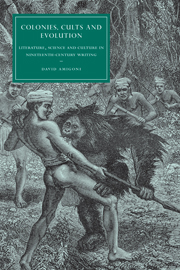Book contents
- Frontmatter
- Contents
- Acknowledgements
- Introduction: literature, science and the hothouse of culture
- 1 ‘Symbolical of more important things’: writing science, religion and colonialism in Coleridge's ‘culture’
- 2 ‘Our origin, what matters it?’: Wordsworth's excursive portmanteau of culture
- 3 Charles Darwin's entanglements with stray colonists: cultivation and the species question
- 4 ‘In one another's being mingle’: biology and the dissemination of ‘culture’ after 1859
- 5 Samuel Butler's symbolic offensives: colonies and mechanical devices in the margins of evolutionary writing
- 6 Edmund Gosse's cultural evolution: sympathetic magic, imitation and contagious literature
- Conclusion: culture's field, culture's vital robe
- Notes
- Bibliography
- Index
- CAMBRIDGE STUDIES IN NINETEENTH-CENTURY LITERATURE AND CULTURE
1 - ‘Symbolical of more important things’: writing science, religion and colonialism in Coleridge's ‘culture’
Published online by Cambridge University Press: 22 September 2009
- Frontmatter
- Contents
- Acknowledgements
- Introduction: literature, science and the hothouse of culture
- 1 ‘Symbolical of more important things’: writing science, religion and colonialism in Coleridge's ‘culture’
- 2 ‘Our origin, what matters it?’: Wordsworth's excursive portmanteau of culture
- 3 Charles Darwin's entanglements with stray colonists: cultivation and the species question
- 4 ‘In one another's being mingle’: biology and the dissemination of ‘culture’ after 1859
- 5 Samuel Butler's symbolic offensives: colonies and mechanical devices in the margins of evolutionary writing
- 6 Edmund Gosse's cultural evolution: sympathetic magic, imitation and contagious literature
- Conclusion: culture's field, culture's vital robe
- Notes
- Bibliography
- Index
- CAMBRIDGE STUDIES IN NINETEENTH-CENTURY LITERATURE AND CULTURE
Summary
RE-LOCATING COLERIDGE’S ‘CULTURE’
As Robert J. Richards has pointed out, Charles Darwin read John Stuart Mill’s famous essay on Coleridge during the course of his reading on the species question. He used it to speculate on instincts, but consigned the notation to a bundle of notebooks that were labelled ‘Old and Useless Notes’. Coleridge has in fact proved to be highly usable, and his legacy has resonated widely in a variety of domains of the intellectual field. Raymond Williams’s Culture and Society explored the legacy of Coleridge’s contribution to the formation of the culture concept by focusing on John Stuart Mill’s essays on Coleridge and Bentham. While Williams thought it would be a ‘mistake’ to suppose that Mill was presenting ‘an impartial judgement of the ideas of Bentham and Coleridge’ (65), if anything Mill was being excessively judicious, striving to occupy the place of ‘culture’ imaged as a court of appeal. Mill crafted a unity of purpose between Jeremy Bentham and Samuel Taylor Coleridge in two essays for the Westminster Review, ‘Bentham’ (1838) and ‘Coleridge’ (1840). As Adrian Desmond’s work has argued, Benthamites and Coleridgeans had been at intellectual war with one another from their respective enclaves of University College and King’s College, London. Medical education and the politics of transmutational speculation in the life sciences were battlegrounds in the warfare between these institutions and the intellectual formations that gathered around them; they have left their mark on Coleridge’s invention of an idea of ‘culture’.
- Type
- Chapter
- Information
- Colonies, Cults and EvolutionLiterature, Science and Culture in Nineteenth-Century Writing, pp. 31 - 56Publisher: Cambridge University PressPrint publication year: 2007

